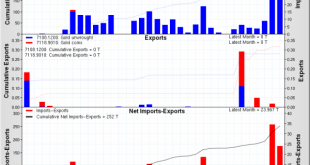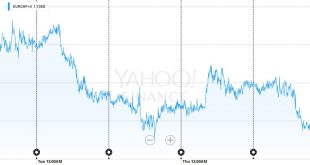The buck. The Dollar Increases in Value The dollar moved up, though most people would say gold fell about $40, and silver 32 cents. In the mainstream view, the value of the dollar is 1/N (N is the quantity). So how could the dollar go up? Certainly, the quantity keeps on increasing. Our view is different. If you borrow dollars to buy an asset, and the asset doesn’t generate enough yield to pay the interest, you have to sell or default. It should go without saying that it is an...
Read More »A Thank You to the Jackasses Running the Economy
Two of many symptoms of the much-bewailed “populist backlash”… Image via economyincrisis.org Rolling Back 200 Years of Growth BALTIMORE, Maryland – The press reported mixed financial news on Thursday. House sales, oil, unemployment figures… up, down… the news left investors puzzled. Stocks went mostly nowhere. But amid the confusing noise was the sound of an alarm: “Fall in U.S. productivity sparks fears of populist backlash as wages stagnate,” says a lumbering headline in the...
Read More »Emerging Market Preview
EM ended last week on a soft note. The icing on the cake was Yellen’s speech Friday afternoon, which confirmed the more hawkish stance seen in the FOMC minutes and other recent official comments. We warn that with the FOMC meeting and Brexit vote next month, markets are likely to remain volatile and that risk assets (such as EM) are the most vulnerable. Looking at country-specific EM risk, the Brazilian political outlook remains murky as more reports have surfaced of other PMDB officials...
Read More »Venezuela’s Gold Reserves Plunge To Lowest Ever As Maduro Repays Debt With Gold
Several months ago, as Venezuela’s hyperinflating, imploding economy was spinning in freefall, leading to the dramatic episodes of total social collapse such as those profiled in “Scenes From The Venezuela Apocalypse: “Countless Wounded” After 5,000 Loot Supermarket Looking For Food“, we wrote that the country which recently had “run out of money to print its own money” was preparing to liquidate its remaining gold holdings to pay coming debt maturities. Then, courtesy of an analysis by...
Read More »FX Weekly Preview
The US dollar bottomed against nearly all the major currencies on May 3. The hawkish April FOMC minutes that began swaying opinion about the prospects for a summer rate hike were not published until two weeks later, and the confirmation by NY Fed President Dudley was not until May 19. Nevertheless, the shift in expectations for a resumption of the Fed’s gradual normalization of monetary policy is a potent force that has fueled the greenback’s recovery. The place to look for investors’...
Read More »FX Weekly Preview
The US dollar bottomed against nearly all the major currencies on May 3. The hawkish April FOMC minutes that began swaying opinion about the prospects for a summer rate hike were not published until two weeks later, and the confirmation by NY Fed President Dudley was not until May 19. Nevertheless, the shift in expectations for a resumption of the Fed’s gradual normalization of monetary policy is a potent force that has fueled the greenback’s recovery. The place to look for investors’...
Read More »Weekly Speculative Positions: Speculators Slash Yen and Aussie Longs, Net CHF nearly unchanged
Speculators remain Long CHF against USD. The figure is nearly unchanged at 4.0 k CHF contracts. For CHF, both shorts and longs increased.This weeks major change was in the yen and in AUD. Speculators strongly reduced their longs. Yen and Aussie There were only two significant speculative position adjustments in the latest CFTC reporting week ending May 24. Speculators liquidated 31.4k gross long yen contracts, leaving the bulls with 54.8k contracts. It is the largest weekly...
Read More »FX Weekly: Dollar Set to Snap Three-Month Decline
EUR/CHF The EUR/CHF moves lower, following the descent of EUR/USD. This happens often, when European and global growth is sluggish. USD/CHF But the Swiss franc weakened against the dollar. Continued by Marc Chandler: The US dollar was mostly firmer over the past week. There were two exceptions among the major currencies: Sterling and the Canadian dollar. GBP/USD Many linked sterling’s outperformance (+0.8%) to a growing sense that the UK will vote to remain in the EU,...
Read More »How Elon Musk Helps Fools to Part Ways with Their Money
Image credit: Tesla Motors Tesla Goes Fishing Tesla Motors is up to something remarkable. But what it is, exactly, is unclear. According to the Tesla Motors website, the company’s mission is: to accelerate the world’s transition to sustainable transport. Tesla Model 3: the company’s first “mass market” entry so to speak, which is supposed to help the world to reach the nirvana of “sustainable” transport. On the side, it is helping a number of Wall Street firms to increase their...
Read More »The Power Elite: Bumbling Incompetents
Geniuses in Charge BALTIMORE, Maryland – Is there any smarter group of homo sapiens on the planet? Or in all of history? We’re talking about Fed economists, of course. Not only did they avoid another Great Depression by bold absurdity…giving the economy more of the one thing of which it clearly had too much – debt. They also carefully monitored the economy’s progress so as to avoid any backsliding into normalcy. And where do we get this penetrating appraisal? From the Fed economists...
Read More » Swiss Economicblogs.org
Swiss Economicblogs.org









